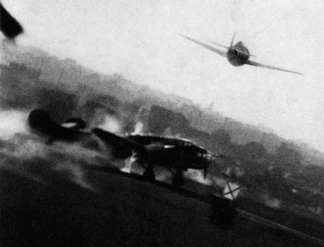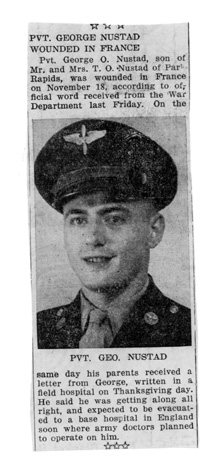Biographical Notes reCharles A. (Chuck) StonePage 3 of 3 Pages, of Chapter 2,INTRODUCTION TO MILITARY AVIATION |
||||||||
| If the reader is going to really comprehend the contents of these next few paragraphs, you are going to have to try and get into my shoes and into my just turned 20 year old, immature, dream-filled head. This wasn't just another step to the next phase of training. This was where we were to receive our coveted silver wings. We had seen this happen in a number of the flag-waving movies we had attended in recent months. There was a stage with potted palms. The Base Commander was there with his staff all present. The cadets, dutifully lined up, one by one mounting the stage, having their hand shook by at least a full colonel as you were “presented” your wings. “Walhalla!!” Angle choirs would sing, the sun would break through the clouds and shine on your face and reflect off your new winged chest. The day dawned bright and sunny. We had breakfast and put on our new officer uniforms and hiked down to the base gym where the ceremony was to be held. A few greedy people were waiting along the way to give you that first salute and get your dollar bill. As I walked into the gym and looked around, my first impression was, “Hell, there are no potted palms on the stage.” I thought to myself, “Oh well, I ’m getting my wings and that should be enough.” Our instructor and his four students found our assigned place in the last row of the gathering. Our instructor had a paper sack in his hand. I thought it strange that he would have brought a bag lunch with him. The ceremony began and we were advised that our instructors would give us our wings, where we stood. Another letdown. No trip across the stage. Again I consoled myself, keeping my eye on the prize, “the wings.” At the appropriate time, our instructor came down the line, reaching in his paper sack for each presentation of the wings. I was the last of his group. When he got to me, he fumbled around in the empty sack and exclaimed “Damn it Stone, I must have picked up the wrong sack. Just act like you have got em and I’ll get a pair for you when the ceremony is complete.” Striving to be resilient and dutiful, I said that would be just fine. After all, I was going to P-40 transition and then to P-51s. |
||||||||
| An Army Air Corps pilot, just returned from flying combat over France and Germany in his P-47 “Thunderbolt” gave us a rousing talk about the glories of clipping the hedges, blowing up trains, fuel dumps, trucks and all that stuff. While this was going on, I noted the Master Sergeant from Base Headquarters was trying to quietly slide across the back of the stage so he could get the ear of the Base Commander. When he finally got into position and bent down to deliver his message, even from my remote position in the back of the room, I could see the Base Commander’s eyes bulge when he comprehended what the Sergeant had to say. |
||||||||
 |
||||||||
|
conducted in preparation for the D-Day invasion, WW II. Photo from U.S. Military Archives |
||||||||
| The speech over, the Base Commander stood and made an announcement. There had been a change in plan just received from higher headquarters. They were going to have to change all of our assignment orders and we would report back to the gym at 16:00 hours that afternoon to learn of our revised destination. I belatedly was handed my wings and we headed back to the barracks and lunch, imagining what this new edict from higher headquarters might hold for our futures. We imagined that we were needed so desperately that they would skip the P-40 transition and maybe send us off directly to P-51 upgrading. There were many other versions in our flights of fancy, but the facts of life awaited us at 16:00 hours. We were there with outstretched hands at 16:00 hours. As we each opened our new orders and began comparing notes, the truth became quite apparent. Our graduating class had been divided into four quarters. The first quarter, including me, would have a short leave time and soon report to Amarillo Air Base, Texas, to begin B-29 Flight Engineer Training. The second quarter would have a longer leave time and would soon be reporting to the same destination for the same purpose. The third quarter would be held at Foster Field in a holding pool for later assignment to the same destination for the same purpose when there were openings at the school. The fourth quarter would be held in a pool at Foster Field, pending some later decision regarding their future, currently unknown. We had run smack dab into a jammed up combat crew pipeline and the powers-that-be were changing priorities. Some high ranking officers had reached the conclusion that a dual rated pilot/flight engineer on the B-29 made a lot of sense. Be assured, at our level of thinking, it made no sense at all and the remains of our broken hearts and dreams were scattered all over the base that day. |
||||||||
| In sharing this with you, I have tried to reflect the emotions and attitudes that were mine and certainly shared by many of our cadet group. Looking back, I am ashamed of myself, realizing that while we were in advanced flight training, there were Marines being slaughtered on Iwo Jima in one of the bloodiest battles in the history of the world. Many of these soldiers were 16 to 20 years of age, moved from a school environment into brutal and deadly combat in a remarkably short time. Aviation Student friends of mine, including my old high school buddy, George Nustad, who had finally made it into the pilot training program only to be pulled out and sent to combat on very short notice with minimal training. George was wounded in the Battle of the Bulge. Brave men and women, from all of the services had been going through their own hells of patriotic duty while I was fulfilling my dream to fly. My chagrin at being cut off at the pass, enroute to the cockpit of a P-51, was immature, petty, and stupid. As I have studied the stories of a variety of WW-II participants, I have felt an increasing sense of guilt that my personal experience in WW-II was such a relatively joy-filled adventure. I suspect that this underlying feeling that my sense of duty remained unfulfilled had something to do with my later life decision to be voluntarily recalled during the Korean War. This lifelong sense of relief, mixed with guilt, has been a common malady of a great many of the surviving members of the WW II generation. |
||||||||
 |
||||||||
| In reflection, with the added benefit of a longer period of life experience, I realize that this was the dawning of one of the most important lessons that I have learned over a lifetime. If later generations can learn something from my own experience, they might avoid some of the heartache and disappointment that I experienced. I have been a goal-oriented person for as long as I can remember and I believe there is no fault in that. The lesson here is this: The major joy and benefit from striving for a goal is not so much in its achievement. It is the joy and energy generated along the way while pursuing a goal that is the true blessing. Choices for medium and long range goals are made with assumptions, incomplete information, in a world that is changing every day as you strive for the prize. If you achieve your goal, you do so in an environment that is different than what you might ever have imagined. If you have periodically changed direction in your pursuit, or modified your goal, you have benefited along the way through the motivation and satisfaction that comes with moving in a direction of choice. If you fail to enjoy the gifts inherent in the goal pursuit process, you have squandered one of the greatest gifts of life. |
||||||||
|
End of Page 3 of 3 Pages, Chapter 2 — Go to Chapter 3 Click below to select a destination Go to Page 1 — 2 — 3, this Chapter Chapters 1 — 2 — 3 — 4 — 5 — 6 — 7 — 8 — 9 — 10 |
||||||||